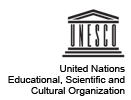UNESCO

Since its foundation in 1945, UNESCO (http://en.unesco.org/) – as the only United Nations specialised agency for education, science, culture, communication and information – works towards creating the conditions for peace and dialogue among civilizations, cultures and peoples, based upon respect for commonly shared human values. Being an international organisation, UNESCO’s unique competencies contribute to the realisation of internationally agreed development goals, including those related to education and lifelong learning using ICTs. Through its large network of field offices and National Commissions – covering 195 countries globally and 45 European countries – as well as being a founder of numerous networks on various thematic areas around the world, UNESCO has a comparative advantage to act as a normative setter, catalyst of ideas, clearing- house and capacity builder within the areas of its global mandate.
Within the UN system, UNESCO leads the implementation of the Education for All goals, aiming to meet the learning needs of all children, youth and adults. It promotes the ultimate goal of inclusive education, which is viewed as a means to ensuring a quality education for all and to achieving wider social inclusion goals around the world. The access to accessible information for marginalised social groups – such as people with disabilities – is also reflected in the strategic documents and related projects as well as programmes such as the Intergovernmental Programme Information for All (IFAP).
UNESCO also contributes to the implementation of the Plan of Action of the World Summit on the Information Society (WSIS) and Millennium Development Goals and the UN Convention on the Rights of Persons with Disabilities. The commitment to provide accessible information using ICTs is reflected in several international normative instruments in the field of education, science, communication and information and realized through concrete projects that provide a solid ground for the building the inclusive information and knowledge societies. UNESCO believes that the recognition of human rights and providing access to information and knowledge, particularly through innovative use of media and ICTs, are conducive to ensuring that every citizen can contribute to social and economic development. Building strategic partnerships and thematic networks are among the overarching objectives of UNESCO that are seen as driving force of sustainable development, not only in respect of economic growth, but also as effective means for lifelong learning, exchange of ideas and experiences, awareness raising and visibility at different levels.
Within the ICT4IAL network activities, UNESCO’s Communication and Information Sector, Knowledge Societies Division, which has extensive expertise and experience in managing similar projects and initiatives at the global level, contributed its expertise and experience in this field and support the establishment of the multi-disciplinary network for the development and application of the Guidelines for Information Accessibility and its relevance for learning. UNESCO provided feedback on and international validation of the ICT4IAL guidelines and promoted them inside and beyond Europe. UNESCO’s input ensured the ICT4IAL guidelines are fully in line with international normative instruments such as the United Nations Convention on the Rights of Persons with Disabilities (UNCRPD 2006).